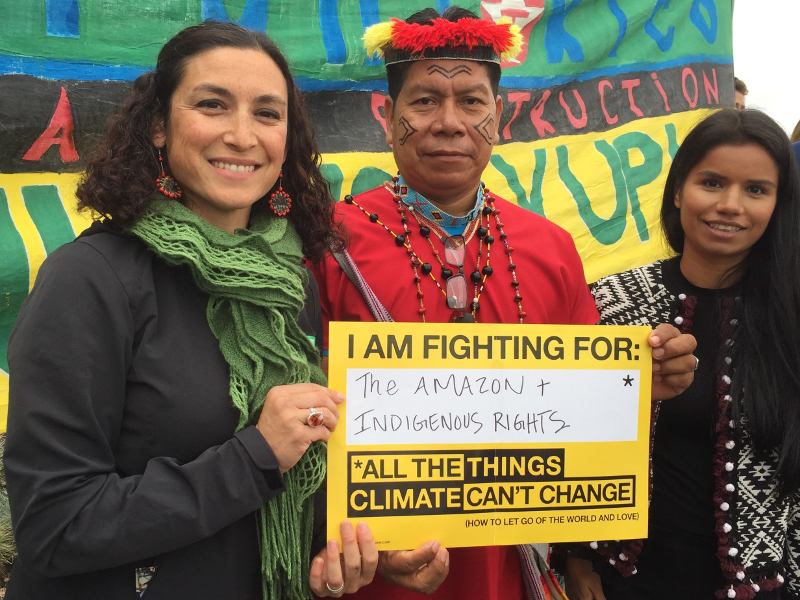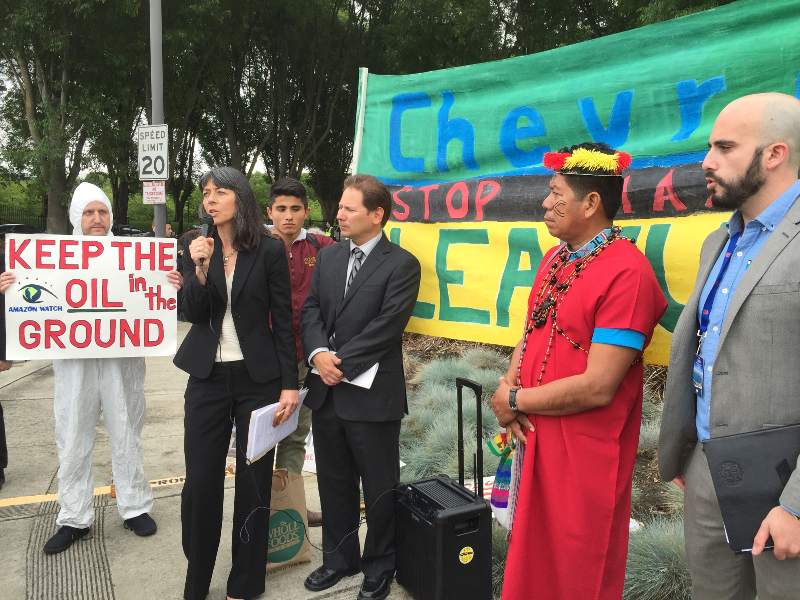Chevron Draws Protest on Climate and Ecuador
By Adam Klasfeld, Courthouse News
25 May 2015

Amid low oil and natural-gas prices, Chevron reported a tough year at its annual shareholders meeting on Wednesday. Protesters outside headquarters said more troubles will lie ahead if the oil giant does not shift course on its approach to climate change and litigation with Ecuadoreans.
Amazon Watch, a San Francisco-based environmental group, has crashed several such meetings in its 15-year fight to make the oil giant pay billions for drilling by Chevron subsidiary Texaco in the Amazon rainforest.
In a now-familiar ritual, the group brought the region's indigenous leaders to confront Chevron's CEO John Watson.
No recording devices were allowed inside Chevron's San Ramon-based headquarters during the meeting, but one observer from Amazon Watch reported that roughly 50 protesters gathered outside and 100 people went inside the tightly secured room.
During the meeting, there was testy exchange between Watson and Secoya leader Humberto Piaguaje, said Amazon Watch's Paul Paz y Mino in a phone interview.
A federal judge in New York blocked the $9.5 billion verdict against Chevron in Ecuador as fraudulent, but Piaguaje emphasized the reality of pollution at his rainforest home.
Paz y Mino said Watson infuriated Piaguaje this year by suggesting that indigenous people like him are being manipulated by U.S.-based attorneys.
"Mr. Watson, stop your racism against us," Piaguaje said, according to Amazon Watch. "We are neither manipulated nor will we ever be manipulated by lawyers or anyone else, as you continually repeat. We are intelligent enough to think and act for ourselves and to seek justice."

Though Chevron emphasized its 2014 New York victory against the Ecuadoreans in its proxy statement this year, there have been setbacks in the intervening years.
The Second Circuit has spent more than a year considering whether to overturn Chevron's trial victory, and the Canadian Supreme Court allowed the Ecuadoreans to try to seize the oil giant's assets in Ontario.
Meanwhile, a key witness in Chevron's fraud case repudiated much of his testimony last year.
Chevron has long vowed to fight the Ecuador case, in the words of one spokesman, until "hell freezes over" and then "fight it out on the ice," but this position has upset a sizeable minority of its shareholders who proposed calling a special meeting to reassess the company's litigation strategy.
"Instead of negotiating an expedient, fair, and comprehensive settlement with the affected communities in Ecuador, management opted for a costly legal strategy that resulted in significant missteps, including moving the case from New York to Ecuador," their resolution states.
That resolution mustered 30 percent of today's vote, representing $57.6 billion of assets and holding roughly steady from a similar proposal last year.
The meeting lasted less than two hours, and Watson reported that the company shed $6 billion in assets, Paz y Mino added.
Watson acknowledged that last year was a rough one for Chevron.
"Low oil and natural gas prices made 2015 a challenging year for Chevron and the oil and gas industry," he said in a statement. "Chevron is taking significant actions to ensure we are well placed to emerge from this challenging operating environment in a position of strength."
In a phone conference on Tuesday, Piaguaje, the indigenous leader, urged reporters to look beyond the intricacies of the legal process.
"This is about justice," he said through a translator. "This is about cleaning up the mess that they made, and this is about remediating it and trying to make things right."
Deborah Moore, a senior campaign manager from the Union of Concern Scientists, told reporters during the same phone conference about other proposals to force Chevron to provide greater transparency on the topic of climate change.
The issue has become a hot topic this past year amid reports that ExxonMobil privately acknowledged that human activity caused climate change for decades, even as the company publicly denied it.
State attorneys general from New York and Texas are now investigating ExxonMobil for fraud, but Moore says that ExxonMobil was hardly alone among petroleum companies allegedly deceiving the public about greenhouse gas emissions.
"Just like the tobacco industry, Chevron, ExxonMobil and other fossil fuel companies have been telling investors and consumers that climate change is theoretical or uncertain or disputed, while privately knowing the opposite to be true," Moore said. "Under existing law, that's called fraud."
Chevron's board got their way in their recommendations against six proposals tackling climate change.
One defeated resolution to reduce greenhouse-gas emissions targets had 92 percent of votes against it.
Shareholders also outvoted another measure by 72 percent to report lobbying through companies that deny climate change, like the American Legislative Exchange Council. Just 19 percent of shareholder backed a bid to appoint an independent director with environmental expertise.
Reached after the meeting for a follow-up interview, Moore blamed these losses on Chevron's boards, and noted that Shell's board addressed climate change differently at last year's annual shareholders meeting in The Hague, Netherlands.
Before that meeting, Shell's board came out in support of a resolution requiring the Dutch company to test its business against international goals, and the shareholders overwhelmingly voted in its favor by more than 98 percent, The Guardian reported.
"When the company changes it directive, shareholders listen," Moore noted.